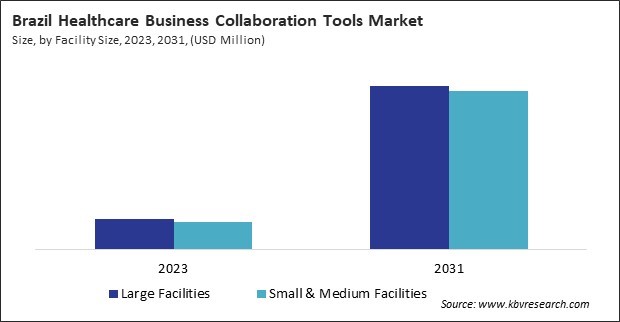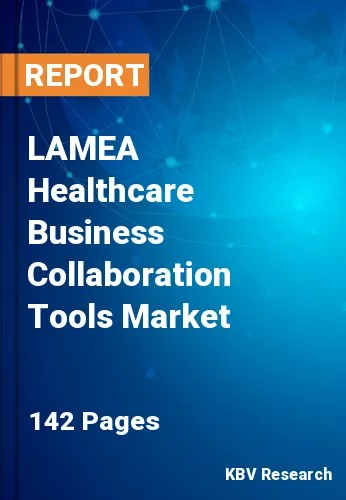The Latin America, Middle East and Africa Healthcare Business Collaboration Tools Market would witness market growth of 25.9% CAGR during the forecast period (2024-2031).
The Brazil market dominated the LAMEA Healthcare Business Collaboration Tools Market by Country in 2023, and would continue to be a dominant market till 2031; thereby, achieving a market value of $2,688.3 million by 2031. The Argentina market is showcasing a CAGR of 26.9% during (2024 - 2031). Additionally, The UAE market would register a CAGR of 24.9% during (2024 - 2031).

Advances in cloud computing, artificial intelligence, and secure data transmission have made collaboration tools more reliable, efficient, and user-friendly, encouraging their adoption across the healthcare sector. Healthcare organizations are increasingly recognizing the cost-saving potential of collaboration tools. These tools can significantly lower operational costs by reducing the need for physical infrastructure and enabling more efficient resource utilization.
These tools are used to achieve various objectives, enhancing clinical and administrative functions. Tools facilitate communication among specialists involved in a patient’s care, ensuring that all team members are on the same page and can contribute to comprehensive treatment plans. Remote monitoring and telehealth enable healthcare providers to detect and address health issues early, preventing complications and hospitalizations.
The increasing healthcare budgets in the UAE and Argentina are setting the stage for substantial advancements in healthcare infrastructure, particularly in healthcare business collaboration. As both countries prioritize healthcare development, there is a growing demand for advanced collaboration tools that enable healthcare professionals, organizations, and service providers to work together more effectively. These tools facilitate communication, coordination, and decision-making, helping to improve patient care and operational efficiency. For healthcare professionals in Argentina, the rise in government investment will mean greater reliance on these tools to facilitate remote consultations, coordinate care across different healthcare institutions, and ensure the timely sharing of patient data. Digital tools that can assist in managing patient workflows, track progress on public health initiatives, and support telemedicine efforts will become essential as the country looks to improve healthcare access and efficiency. Therefore, two major reasons propelling the growth of the healthcare business collaboration tools market are the increasing healthcare budget in the United Arab Emirates and the growing healthcare investments in Argentina.
Free Valuable Insights: The Worldwide Healthcare Business Collaboration Tools Market is Projected to reach USD 138.6 Billion by 2031, at a CAGR of 23.1%
Based on Type, the market is segmented into Communication & Coordination Software and Conferencing Software. Based on Deployment, the market is segmented into On-Premises and Cloud. Based on Facility Size, the market is segmented into Large Facilities and Small & Medium Facilities. Based on countries, the market is segmented into Brazil, Argentina, UAE, Saudi Arabia, South Africa, Nigeria, and Rest of LAMEA.
By Type
By Deployment
By Facility Size
By Country
Our team of dedicated experts can provide you with attractive expansion opportunities for your business.

